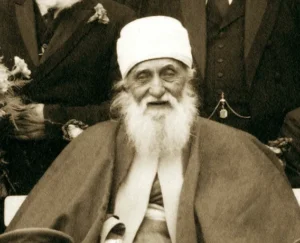Abdu’l-Bahá, the son of Bahá’u’lláh and a key figure in the Bahá’í Faith, was a visionary leader known for his teachings on unity, peace, and social justice. Among his many contributions, Abdu’l-Bahá emphasized the importance of health and nutrition for a better future. He believed that food plays a vital role not only in individual well-being but also in the advancement of society. His ideas about food and nutrition offer valuable insights into how we can nourish ourselves and our communities as we move toward a healthier, more sustainable future.
Abdu’l-Bahá’s teachings stress the significance of healthy eating habits, ethical food choices, and the interconnectedness of all people. He believed that when individuals prioritize their health and the health of their communities, they contribute to the overall progress of humanity. In this article, we will explore Abdu’l-Bahá’s views on food, how they relate to modern concepts of nutrition, sustainability, and social responsibility, and what we can learn from his teachings for a brighter future.
Understanding Abdu’l-Bahá’s Perspective on Food
The Importance of Nourishment
Abdu’l-Bahá taught that food is essential for physical, mental, and spiritual well-being. He encouraged people to consider the nutritional value of the food they consume and to make choices that support their health. This perspective aligns with modern understanding of nutrition, which emphasizes the importance of balanced diets that include a variety of nutrients.
He also emphasized that food should be enjoyed and appreciated. Abdu’l-Bahá believed that sharing meals fosters connections between individuals and strengthens relationships within communities. This idea reflects the notion that food is not just sustenance but also a source of joy, culture, and togetherness.
Ethical Food Choices
Abdu’l-Bahá advocated for ethical food choices, emphasizing the importance of consuming foods that are produced sustainably and with respect for all living beings. He believed that people should be mindful of the impact their food choices have on the environment and society. This concept is increasingly relevant today as more individuals seek to understand the origins of their food and the consequences of industrial agriculture.
He also encouraged the consumption of plant-based foods, which are generally more sustainable and healthier than animal-based options. By promoting vegetarianism, Abdu’l-Bahá highlighted the importance of compassion towards animals and the environment. This aligns with contemporary movements advocating for plant-based diets as a means to address issues such as climate change and health concerns.
Food as a Tool for Community Building
Promoting Unity through Sharing Meals
Abdu’l-Bahá believed that sharing food is a powerful way to promote unity and understanding among people. He encouraged gatherings where individuals from diverse backgrounds could come together, share meals, and learn from one another. These communal meals foster a sense of belonging and cooperation, which are essential for building harmonious communities.
In today’s world, the concept of community meals is gaining traction as people recognize the importance of social connections. Many organizations promote potluck dinners, community gardens, and shared cooking events to bring people together. Abdu’l-Bahá’s teachings serve as a reminder of the enduring value of these practices, which help cultivate friendships and understanding among diverse groups.
Health and Wellness in the Community
Abdu’l-Bahá also emphasized that a healthy community is built on the health of its individuals. He believed that everyone has a role in promoting wellness within their communities. This includes not only making healthy food choices for oneself but also advocating for better access to nutritious foods for all.
This idea is reflected in modern public health initiatives that aim to improve food security and nutrition in underserved areas. Communities that prioritize health and well-being are more resilient and better equipped to face challenges, whether they be environmental, economic, or social.
The Future of Food: Lessons from Abdu’l-Bahá
Sustainability and Environmental Responsibility
Abdu’l-Bahá’s teachings about ethical food choices resonate strongly in today’s context of environmental sustainability. The current food system faces significant challenges, including climate change, resource depletion, and pollution. By following Abdu’l-Bahá’s guidance to consume sustainably produced foods, individuals can contribute to a healthier planet.
Sustainable agriculture practices, such as organic farming and regenerative agriculture, align with Abdu’l-Bahá’s vision of compassion towards the earth and all its inhabitants. By supporting local farmers and making informed choices about food production, individuals can help create a more sustainable food system that benefits both people and the planet.

Emphasizing Health and Well-Being
Abdu’l-Bahá’s emphasis on health and nutrition is particularly relevant in our current society, where many people face health issues related to diet and lifestyle. Chronic diseases, such as obesity, diabetes, and heart disease, are on the rise, making it essential for individuals to adopt healthier eating habits.
Incorporating Abdu’l-Bahá’s teachings into our daily lives can help guide us towards better health. This includes choosing whole, nutrient-dense foods, practicing mindful eating, and fostering a supportive community around food. By prioritizing our health, we can create a brighter future for ourselves and future generations.
Conclusion
In conclusion, abduhl baha food of the future offer valuable insights for creating a better future. His emphasis on nourishment, ethical food choices, and community building highlights the importance of food in our lives and society. As we navigate the challenges of modern living, Abdu’l-Bahá’s wisdom serves as a guiding light, encouraging us to make choices that support our health and the well-being of our communities.
By embracing sustainability, promoting health and wellness, and fostering connections through food, we can work together to build a more harmonious and resilient future. The lessons we learn from Abdu’l-Bahá’s perspective on food can inspire us to create positive change, both individually and collectively, for generations to come.
FAQs
Q: What did Abdu’l-Bahá teach about food?
A: Abdu’l-Bahá emphasized the importance of nutritious food for health and well-being and encouraged ethical food choices that promote sustainability.
Q: How can food promote community unity?
A: Sharing meals brings people together, fosters relationships, and promotes understanding among diverse groups.
Q: What are some modern practices that align with Abdu’l-Bahá’s teachings?
A: Community gardens, potluck dinners, and sustainable farming practices reflect his emphasis on health, unity, and ethical food choices.
Q: Why is sustainability important in food production?
A: Sustainable food production helps protect the environment, conserves resources, and ensures food security for future generations.
Q: How can individuals contribute to a healthier food system?
A: Individuals can support local farmers, choose whole foods, and advocate for policies that promote nutrition and food access in their communities.



















































